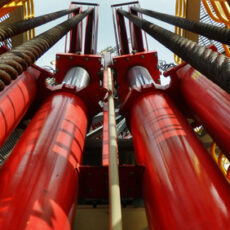 Hydraulic systems are widely used in various industries, including manufacturing, construction, and agriculture, to generate and transmit power. These systems operate under high pressures, often exceeding 3000 psi, to deliver precise and efficient performance. However, working with high-pressure hydraulic systems can be dangerous if proper safety measures are not followed. In this blog, we will discuss some important safety considerations to keep in mind when working in high-pressure hydraulic environments.
Hydraulic systems are widely used in various industries, including manufacturing, construction, and agriculture, to generate and transmit power. These systems operate under high pressures, often exceeding 3000 psi, to deliver precise and efficient performance. However, working with high-pressure hydraulic systems can be dangerous if proper safety measures are not followed. In this blog, we will discuss some important safety considerations to keep in mind when working in high-pressure hydraulic environments.
Understanding the Risks
One of the first steps in ensuring safety in high-pressure hydraulic environments is understanding the risks involved. High-pressure hydraulic systems can pose serious risks of injury or even death if not handled properly. The pressure generated by these systems can cause severe injuries, including cuts, bruises, or even amputations if a leak or rupture occurs. It is important to be aware of the potential hazards and take necessary precautions to prevent accidents.
Training and Education
Proper training and education are essential for anyone working with high-pressure hydraulic systems. All operators and maintenance personnel should receive thorough training on the safe operation, maintenance, and troubleshooting of hydraulic systems. Training should include information on identifying potential hazards, proper use of personal protective equipment (PPE), emergency procedures, and safe work practices. Regular refresher training sessions should be conducted to ensure that employees are up to date on the latest safety guidelines.
Use of Personal Protective Equipment (PPE)
Personal protective equipment (PPE) plays a crucial role in ensuring the safety of workers in high-pressure hydraulic environments. PPE such as safety goggles, gloves, steel-toed boots, and protective clothing should be worn at all times while working with hydraulic systems. These items can help protect workers from potential injuries caused by flying debris, hydraulic fluid leaks, or high-pressure spray. It is important to inspect PPE regularly and replace any damaged or worn-out equipment to ensure maximum protection.
Implementing Lockout/Tagout Procedures
Lockout/tagout procedures are essential for preventing accidental energization of hydraulic systems during maintenance or repair tasks. Before performing any work on a hydraulic system, operators should follow strict lockout/tagout procedures to isolate the power source and prevent unexpected start-ups. Lockout devices should be placed on all energy sources, and tags should be used to communicate that maintenance work is in progress. Only authorized personnel should have access to the hydraulic system during lockout/tagout procedures.
Proper Inspection and Maintenance
Regular inspection and maintenance of hydraulic systems are essential for ensuring their safe and efficient operation. Equipment should be inspected for leaks, wear and tear, loose fittings, and other potential issues that could lead to accidents. Any faulty components should be repaired or replaced immediately to prevent downtime and ensure worker safety. It is important to follow manufacturer’s recommendations for maintenance intervals and procedures to keep hydraulic systems in optimal condition.
Proper Fluid Handling
Hydraulic fluid is a key component of hydraulic systems and plays a critical role in their operation. Proper handling and storage of hydraulic fluid are essential to prevent contamination and ensure system reliability. Operators should use only recommended hydraulic fluids and follow correct procedures for filling, draining, and disposing of fluid. Spills should be cleaned up promptly to prevent slips and falls. It is important to monitor fluid levels regularly and top up as needed to prevent damage to the system.
Pressure Relief Valves
Pressure relief valves are designed to protect hydraulic systems from overpressure situations by releasing excess pressure. These valves should be installed in all high-pressure hydraulic systems to prevent the buildup of pressure beyond safe limits. Operators should ensure that pressure relief valves are functioning properly and have the correct set pressure for the system. Regular testing and maintenance of pressure relief valves are essential to ensure their effectiveness in preventing accidents.
Emergency Procedures
Despite all safety precautions, accidents can still happen in high-pressure hydraulic environments. It is important to have well-defined emergency procedures in place to respond quickly and effectively to any incidents. All workers should be trained on emergency procedures, including how to shut down equipment, administer first aid, and evacuate the area in case of an emergency. It is also important to have emergency contact information readily available for quick response from emergency services.
Summary
Safety should be the top priority when working in high-pressure hydraulic environments. By following proper safety considerations, operators can minimize the risks of accidents and injuries and create a safe working environment for all employees. Understanding the risks, receiving proper training, using PPE, implementing lockout/tagout procedures, conducting regular inspections and maintenance, handling fluids correctly, installing pressure relief valves, and having well-defined emergency procedures are essential steps in ensuring safety in high-pressure hydraulic environments. By taking these precautions, operators can ensure the safe and efficient operation of hydraulic systems while protecting the well-being of all workers involved.
Got Questions About Industrial Machinery? Let Us Help!
Hydraulic Power Sales, Inc. is local manufacture, distributor, and service provider of hydraulics equipment based in Cordova, California. Since 1985, we have been providing hydraulic repair services, hose assemblies, and sales to businesses throughout northern California. We manufacture hydraulic engine systems and hydraulic cylinders while supplying other hydraulic equipment. We want to be your one source for all of your hydraulic/pneumatic needs. Give us a call today!

